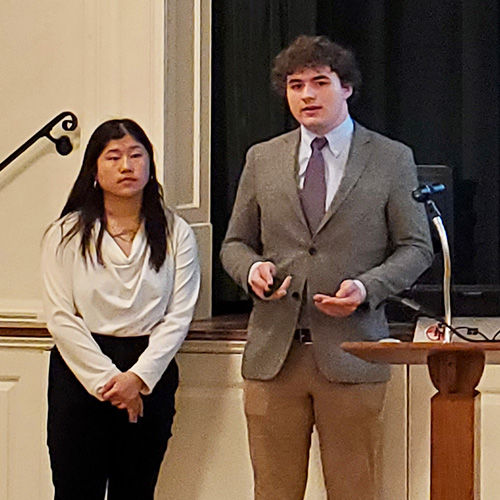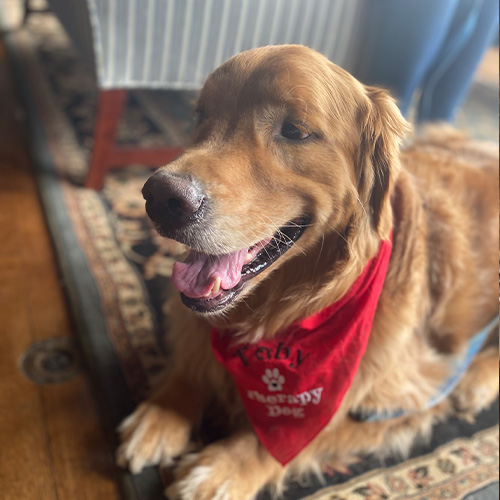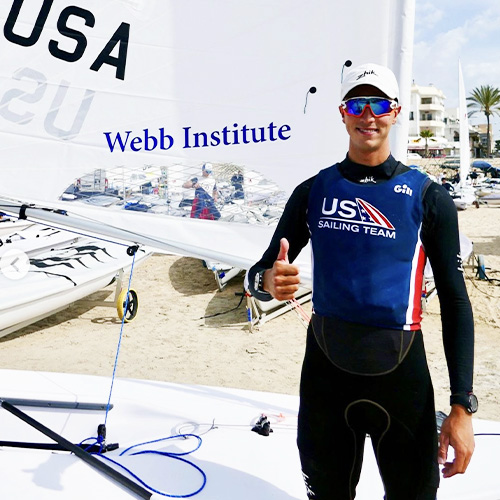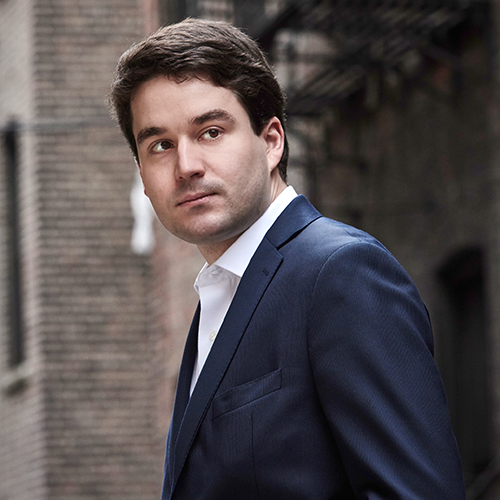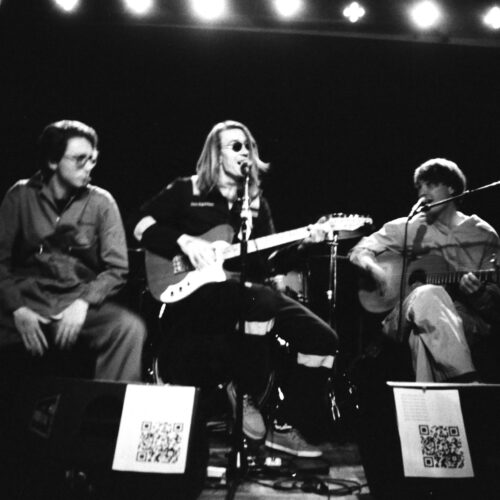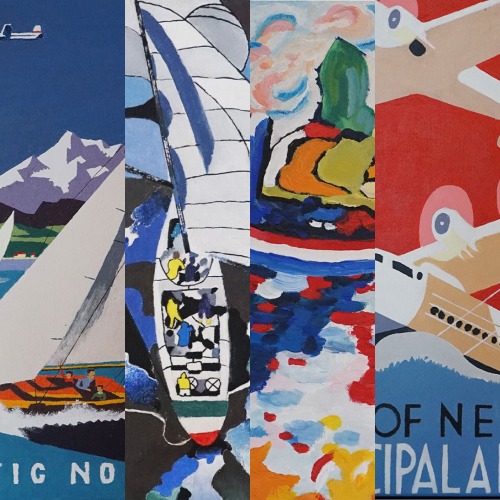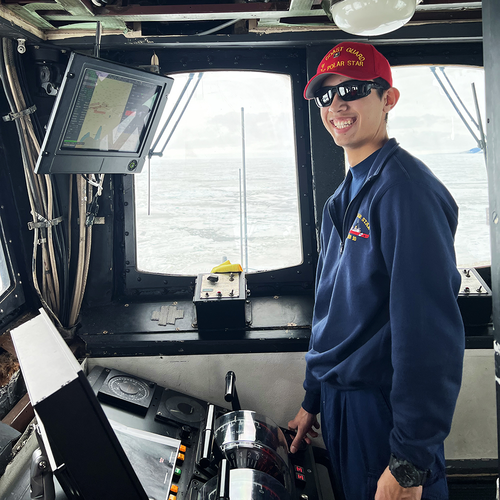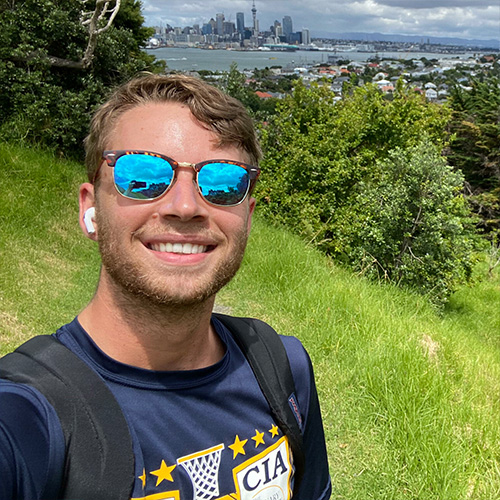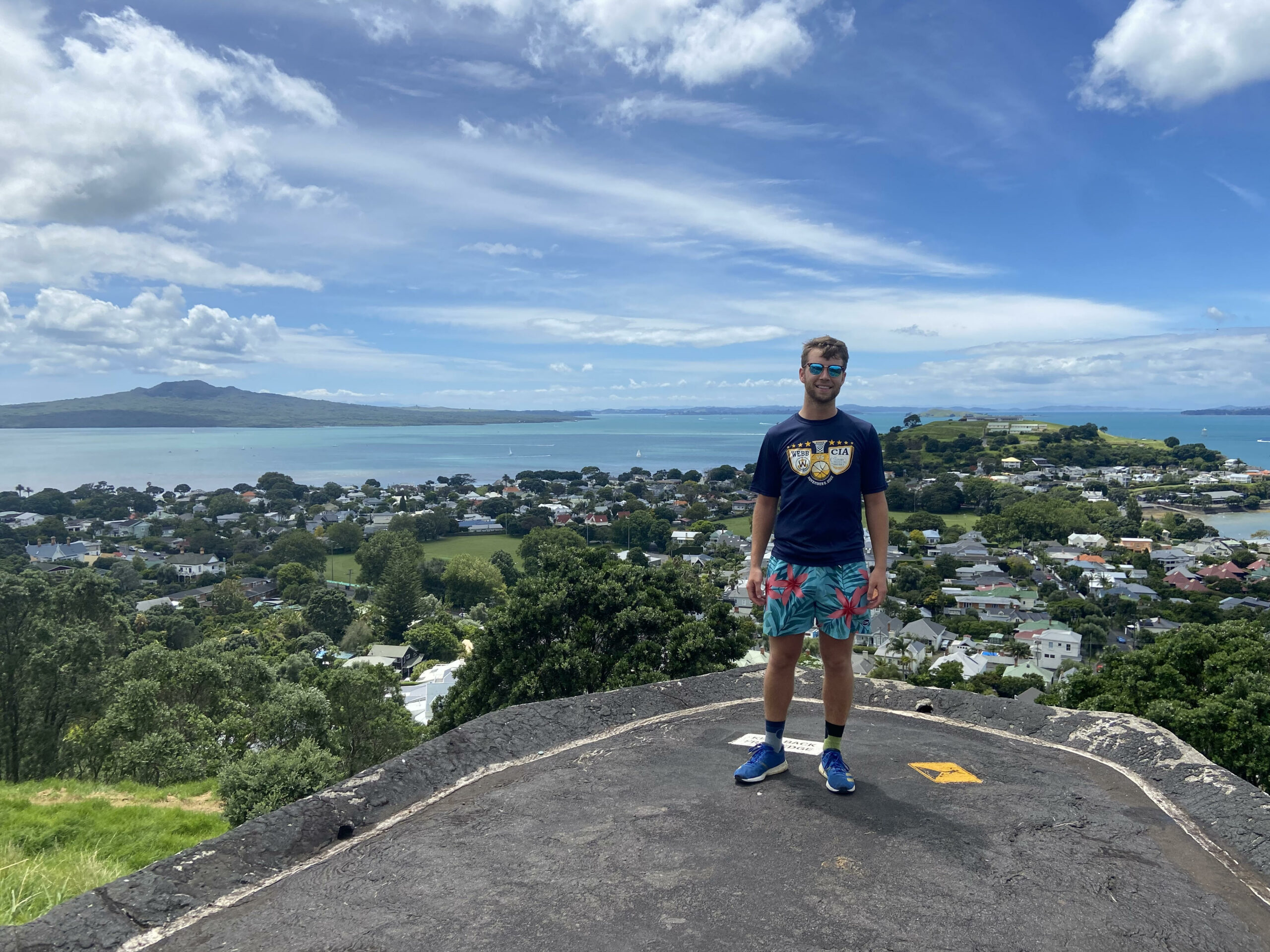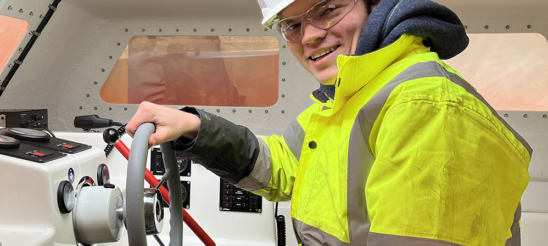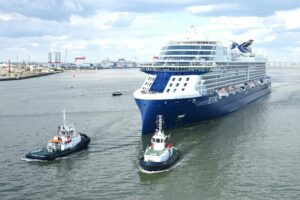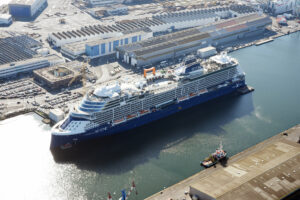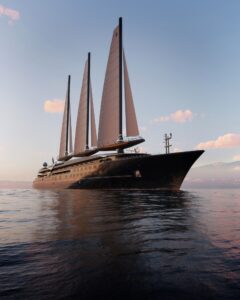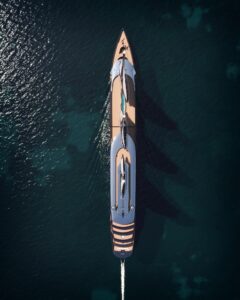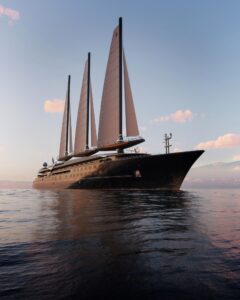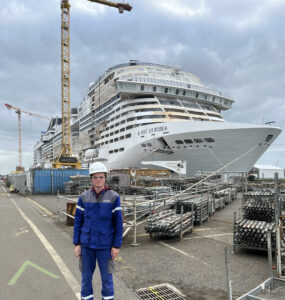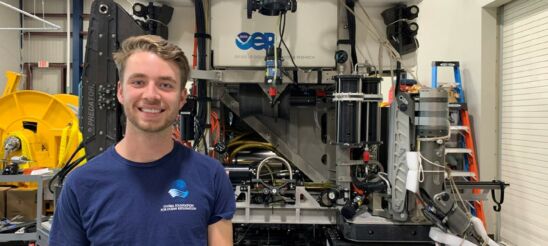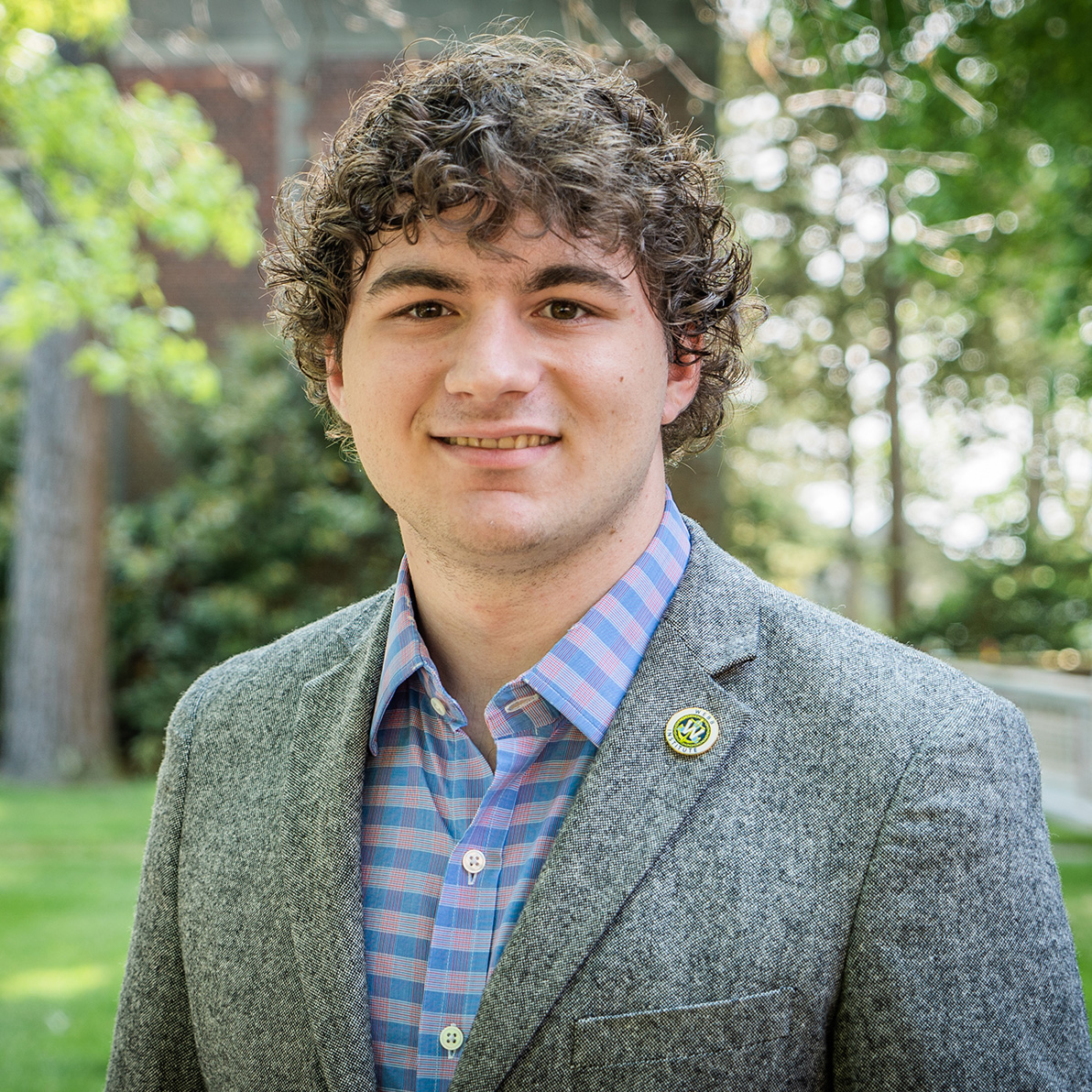
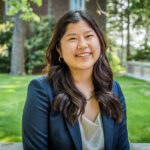 By Spencer Margosian ’23 and Tori Kim ’23
By Spencer Margosian ’23 and Tori Kim ’23
It is the beauty of research that in pursuit of solving even a seemingly simple problem, one will inevitably discover far more new problems to solve than they will answers to publish. Looking back on the past year, the best example of this was when our electrical engineering thesis was almost completely derailed for well over a month, by a problem fundamental to naval architecture. In this article, we would like to discuss how we came across this problem, how we solved it, and how this detour in our work taught us a fundamental principle of research. The minimum viable background for discussion of our thesis takes about four sentences. For large vessels, medium-voltage alternating current is usually used to transmit electrical power.
An emerging technology, medium-voltage direct current power transmission, is poised to be ready for commercial application approximately within the next decade. Because MVDC is a new technology, it is not well known to marine engineers and will likely be underutilized if it remains unknown.
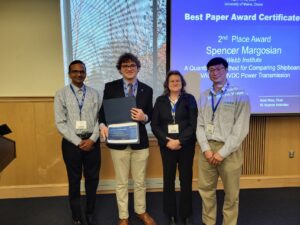
Spencer Margosian ’23 accepting his award during SNAME’s Student Paper night.
Our thesis sets out to identify in simple terms whether MVAC or MVDC is the better system model for a given application so that a marine engineer does not need to do so from first principles. The first time we attempted to compare the two
system models directly, we created two calculation methods which modeled steady-state operation of a given vessel. When we tested the two methods with a computer script, the answers they returned looked like they made sense when considered one-at-a-time. Upon examining the entire set of cases, however, we realized that not a single case actually implied that DC was preferable to AC—not even those which we were positive would be.
The discovery of this fault effectively stopped us in our tracks, not knowing what we had done wrong or how we might fix our program to account for such error. To solve this problem, we would have to embrace a core principle of research: that setting out to solve a problem in one field will often result in encountering new problems in unrelated ones. Following the failure of the original analysis, we would come to realize that using a steady-state analysis failed to account for the biggest advantage of MVDC systems, which is their high efficiency in loads which vary over time. This meant that to properly compare the two system models, it would be necessary to model them as dynamic systems and not constant signals.
“We are immensely grateful to Webb for preparing us not only with the education in marine engineering necessary to understand marine electrical engineering, but also for providing us the naval architecture background that we needed to solve our resistance problem. Despite neither of us identifying as naval architects at heart, the Webb education prepared us to tackle every problem our research threw at us.”
We had found a new problem to solve—how does a ship’s electrical load change throughout a voyage?—and despite our original research being one of theoretical electrical engineering, the answer to our new question relied almost exclusively on our understanding of naval architecture.
The biggest load experienced by a ship at sea is naturally the energy required to propel the vessel through the water. As a ship sails through waves, the resistance imparted on the vessel varies constantly, changing the propulsion power. This phenomenon, called added wave resistance, cannot be easily predicted using statistics—in fact, it is not analytically possible to do so. However, by algebraically manipulating a well-documented standardized wave spectrum, we were able to closely approximate what the added wave resistance spectrum would look like and solve our original problem of characterizing how resistance varies over a voyage.
Watch Spencer and Tori’s Thesis Presentation below:
Click here to view the Class of 2023 Thesis Page
PAWS for a Study Break!
by Alyssa Caliguri, Associate Director of Admissions and Student Affairs
There are typically high levels of stress on college campuses during the weeks leading up to Final Exams. To help address this, a practice common across colleges in the U.S. involves bringing trained therapy dogs to their campuses to interact with their students and provide emotional support. Webb already has a long tradition of dogs visiting (or even residing on) campus. Over the past few years, Sully, Barney, Duke, Pebbles, Callie, Dan, Beau, Diego, Holly, and 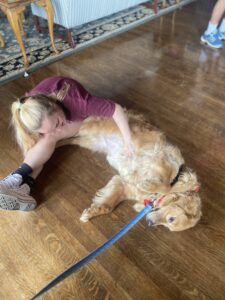 other employee dogs have spent some time on campus with Webbies. On Tuesday, June 15th, two therapy dogs from Therapy Dogs of Long Island joined in on the fun and visited the Webb Institute campus. T to help relieve some stress before final exams. Toby, the golden retriever, and Lucy, a Labrador retriever, greeted students in the Visconti Reception Room and provided some well-deserved relief from the workload and studying. According to Therapy Dogs of Long Island, “Dogs can help improve mental and physical health, pain management, and behavior/interpersonal interaction.
other employee dogs have spent some time on campus with Webbies. On Tuesday, June 15th, two therapy dogs from Therapy Dogs of Long Island joined in on the fun and visited the Webb Institute campus. T to help relieve some stress before final exams. Toby, the golden retriever, and Lucy, a Labrador retriever, greeted students in the Visconti Reception Room and provided some well-deserved relief from the workload and studying. According to Therapy Dogs of Long Island, “Dogs can help improve mental and physical health, pain management, and behavior/interpersonal interaction.
Dogs can also reduce heart rate, blood pressure, fear and anxiety, and aggression.” Toby and Lucy brought unconditional love and many smiles to the students’ faces during this time.
There is something special and calming about a dog’s companionship, and its ability to understand feelings and situations around it, without ever having a conversation.
Marguerite Caliguri, Toby’s owner states, ” Bringing Toby to therapy visits has been very rewarding for both of us as a therapy dog team. Toby can really pick up on people’s feelings; at the same time, I’ve seen people’s attitude change completely for the better once they see Toby coming. It is also equally as rewarding for Toby to socialize, lend a paw, and brighten someone’s day. He thrives on being with people and seeing that he loves it so much, I knew I had to share it with as many people as I can.” Student wellness is key to academic success. The Office of Admissions and Student Affairs hopes to continue providing wellness initiatives throughout the upcoming year to help the students thrive in and out of the classroom environment.
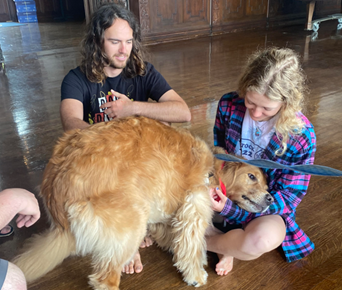
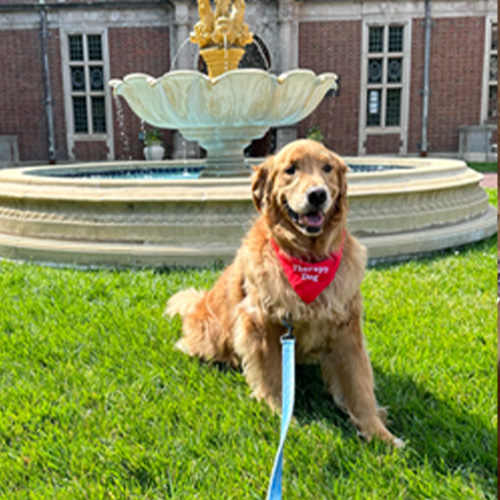
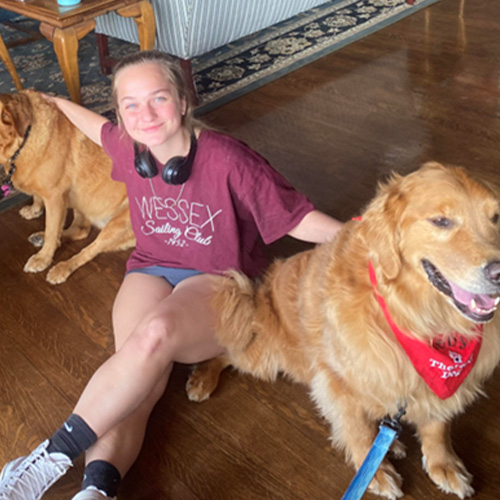
Sailing to the Olympics with Daniel Escudero ’25
How did you become interested in sailing, and what led you to compete at such a high level?
I got introduced to sailing through a learn to sail summer camp program at Bay of Quinte Yacht Club in Canada where I grew up. During the summer of 2016, they offered a racing camp during which I started sailing Lasers (now ILCAs). I had so much fun at the regatta that culminated the camp, I really wanted to continue racing. My parents started signing me up for some local regattas, which is when a coach suggested I join the Lauderdale Yacht Club Racing Team. Anywhere from 20 to 30 boats would show up to practice every weekend. I went to high school near Atlanta, so I had to drive or fly down to Lauderdale to get to weekend practices. At first, I would go to practice once every two or three weeks, but by my junior year, I was in Lauderdale every weekend. At one point, I even took my SAT exam in Lauderdale to not miss practice. I was sailing during all my breaks and holidays. During my last two years of high school, I was ranked 1st Laser Radial (ILCA6, youth class) in North America and made it onto the US Sailing Olympic Development Team. After graduating, I transitioned into the ILCA7, the Olympic class. It was a tough transition as it was like learning to sail a new boat. While at Webb, I managed to work my way into the top 3 ILCA7 in the US putting me into a position to qualify for the 2024 Olympic games.
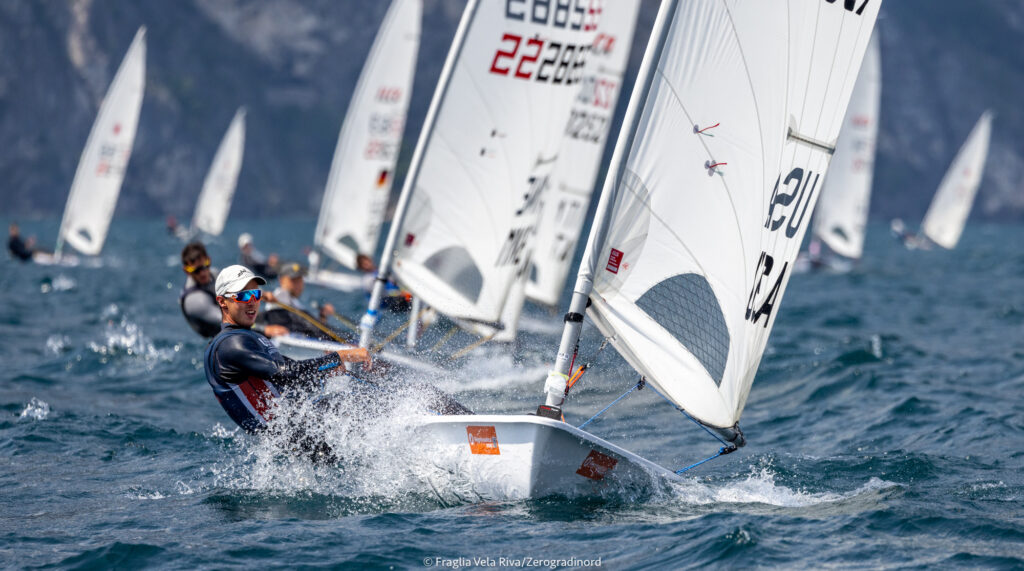
Can you tell us about your journey from being at Webb to your ongoing campaign to qualify for Olympic sailing?
Given the academic workload at Webb, my goal during the Webb semester was focus on my fitness while trying to maintain my sailing skills the best I could. A typical week consisted of at least 2 sailing sessions, weightlifting 3-4 days, and about 80 miles cycling with a local team. I also joined some friends on a few weekends during the semester for some ILCA racing at American Yacht Club. Fortunately, President Martecchini, Dean Werner, and the faculty are extremely supportive of my sailing, and even allowed to take time off to train and compete.
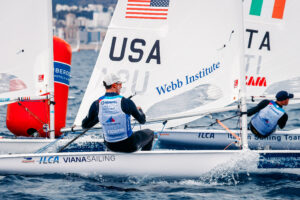
What are some of the challenges that you face in training for the Olympics?
Campaigning for the Olympics is a logistical, planning, and funding nightmare. I don’t stay in the same country for more than two weeks at a time before I travel to the next. I have to make sure my equipment stays in order and everything I need gets to the next place. I’d like to take this moment to thank my parents and my coach. Without them it would be impossible.
Of course, performing and improving is another challenge. The skill gap between the U21 and Senior fleet is massive. Competing against the best in the world is a very humbling experience. Dealing with the stress and pressure of personal expectations of improvement, especially when extremely tired from training and competing can be very challenging. Mentally draining – resilience.
How does it feel to represent both Webb and the USA- on a global platform?
I am very proud to represent Webb and the USA on a global platform. It is great to know that I have my college supporting and cheering for me, and it adds motivation to do my best while training and competing!
What advice would you give to other student-athletes?
The main advice I would give is that everything comes down to time management and prioritizing. Especially with Webb’s demanding academic workload, fitting in the necessary training while leaving some free time available is very tricky but totally achievable.
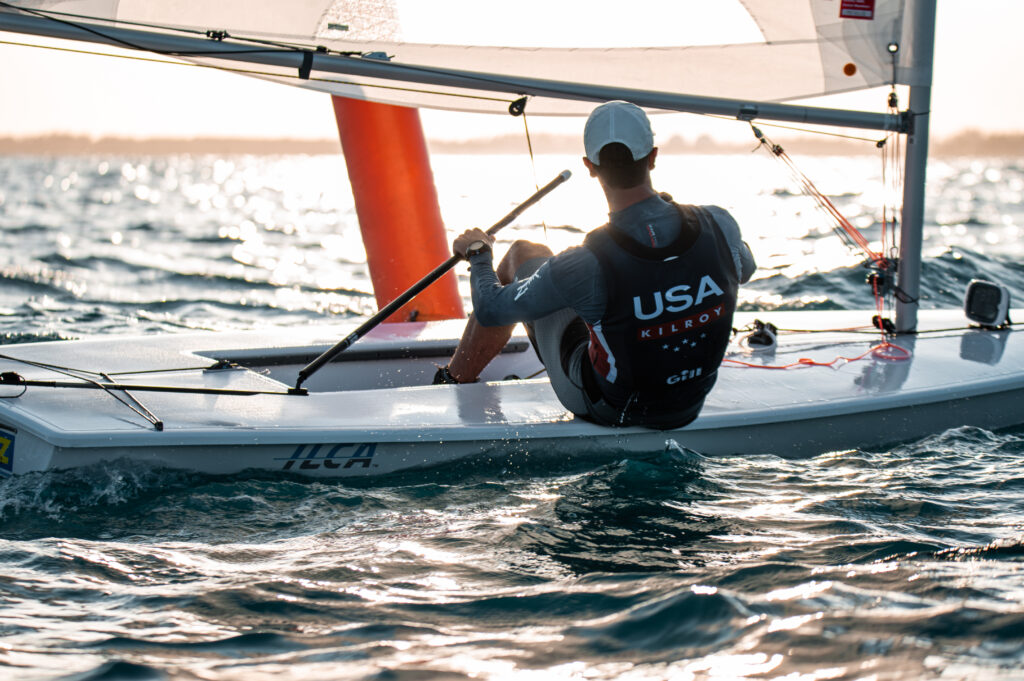
How has Webb impacted you on your journey to the Olympics?
I’d say Webb has helped me greatly improve my stress and time management skills. Since Webb’s academic load can be quite stressful at times, I’ve found that it has improved my resilience and work efficiency, especially when having to complete assignments and exams while competing at regattas at the same time.
I also find it funny when the things we learn at Webb for designing and building container ships apply to my sailing. Webb has helped me get a better understanding of my boat and look at my sailing from a more technical and analytical perspective, which gives me an edge over my competitors. I am very grateful for the invaluable skills I have learned at Webb.
What are your plans for when you graduate from Webb?
I would like to use my Webb degree to get involved in professional sailing like the America’s Cup or SailGP and design faster, more advanced boats. I also have my sights set on campaigning for LA 2028.
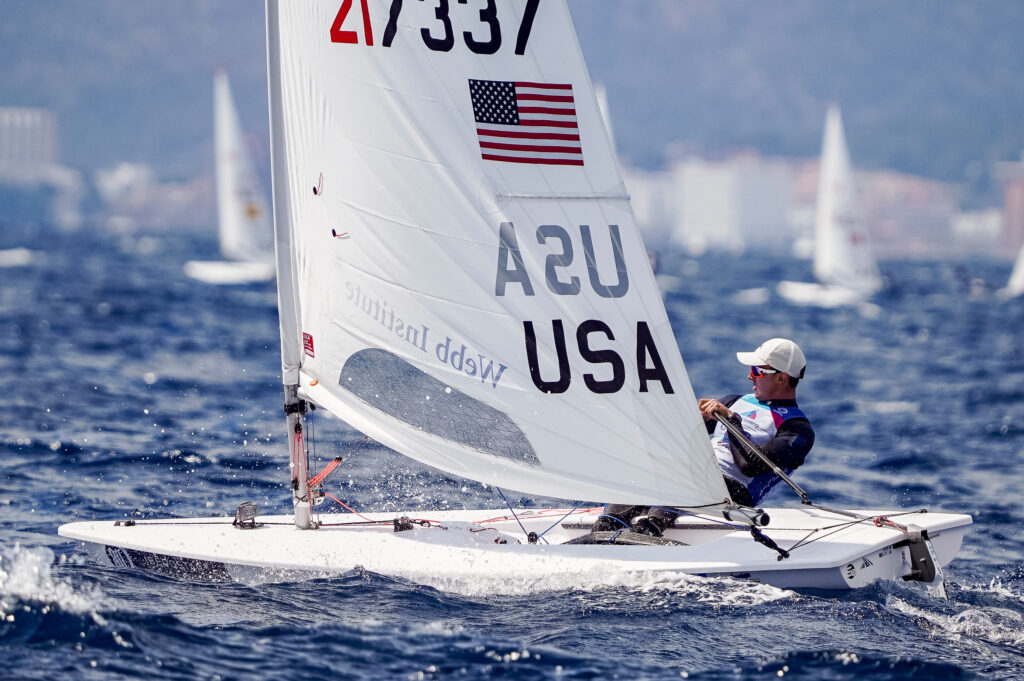
A Harmonious Intersection of Art and Engineering: World-Renowned Pianist, Alexei Tartakovsky Performs at Webb
When world-renowned Russian-American pianist, Alexei Tartakovsky played the music of Mozart, Chopin, and Schubert on the grand piano at Webb Institute on September 7, Webb became more than a school for future shipbuilders. It also became a hub for creators, architects, and engineers – entranced in the journey of musical art and creativity.
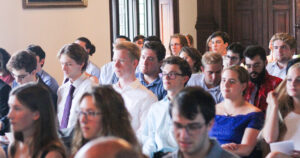
Students dressed in formal attire for a special night of timeless melodies.
“A fantastic musician and pianist,” enthused fellow classical pianist, Martha Argerich, which is a sentiment echoed by the New York Concert Review, calling him “one of the finest young pianists in recent years.”
From winning three top prizes in a single year to a unanimous first prize win at the Heida Hermanns International Piano Competition, Tartakovsky had always stolen the spotlight on international stages. To have him at Webb for our unique community was special.
What made this evening particularly meaningful was the collaborative spirit that brought Tartakovsky to our campus. “Our students not only excel in STEM; they have an appreciation for all facets of human achievement, including the arts and music,” commented Professor Goloubeva, one of the key orchestrators of the event, along with Professor Harris.
Professor Harris, coordinator of our Humanities program at Webb added, “Alexei Tartakovsky’s performance was an enhancement of our Humanities program, and a testament to the multidimensional and creative talent we cultivate here. You can see that our students felt the music deeply.”
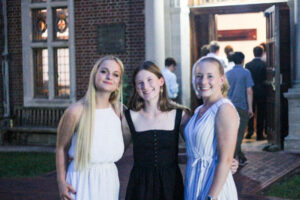
Webbies engage in conversation during the intermission of musical inspiration.
Jack Jackson, a member of the Leadership Committee responsible for the recital, said, “This event, the first of its kind for some of us, was a valuable chance for Webbies to experience the artistry of piano performance and expand our outlook on beauty beyond the engineering curriculum, and into the field of fine art.”
As we send our heartfelt gratitude to Alexei Tartakovsky, who continues his European tour this week in Bonn, we also thank Professor Harris and Gloubeva as well as our pro-active Leadership Committee which includes Thomas Motyka, Ben Calkins, Jack Jackson, Steven Katz and Burke Kanemasu.
Their collective effort enriched what it means to be a Webbie – to be able to take in the magic of engineering and the arts, including the music of Chopin in a Long Island mansion.
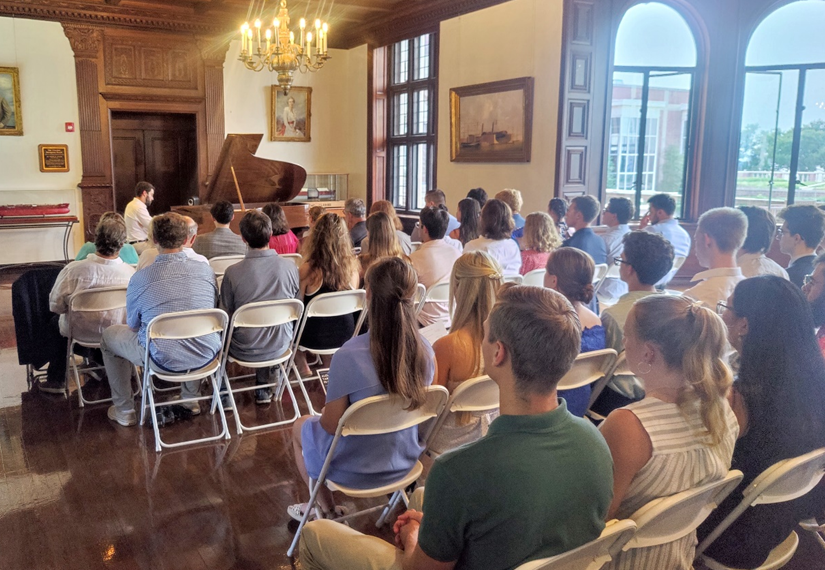
As Alexei Tartakovsky graced Webb Institute’s mansion with notes of classical music, this special night captured the essence of what makes Webb a beautiful place for both mind and soul.
The Ties that Bind: Navigating Dual Passions with Luke Herbermann ’21
When art meets engineering, unexpected harmonies emerge. Luke Herbermann ’21 found the balance in blending a rigorous study of Naval Architecture and Marine Engineering with a deep passion for music and classical guitar.
But how did music and marine engineering coexist? Luke credits Webb for instilling discipline, positive study habits, and creative thinking. Whether playing music or working on the NYC Ferry system, Luke proves that creative hobbies like music not only enrich life but enhance professional skills. Read on to get a glimpse into a life that nurtures two worlds.
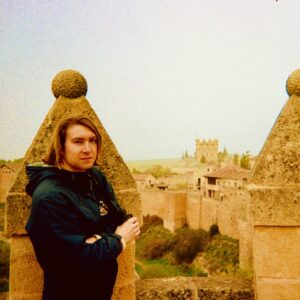
Can you share how you developed an interest in music and how this coexisted with your studies at Webb? (Was it difficult?)
I had the most amazing classical guitar teacher growing up. His name was Joe Smith and he was a phenomenal storyteller and musician. Ironically, I’d often be a bit reluctant to go to my lessons, but when I got there he found a way to inspire me. Joe Smith only once performed solo at those guitar ensemble recitals and I think that one solo performance was the first time I was ever really moved by music. I had no idea he could sing, but he got up and sang “Send in the Clowns” with a classical guitar accompanying him.
While at Webb it was easy to see how studying music years before shaped my positive study habits and my creative thinking. I was lucky enough to have several classmates also interested in music. We’d play in the Webb Jazz band together, sing in WooFS together, and sometimes we’d procrastinate by jamming out late at night. We also organized one of our humanities electives to be a Music Composition Class. Between the music I was playing on my own, the clubs I was in, and the composition elective, it almost felt like I was pursuing a minor in music. I wouldn’t say keeping up with it all was easy, but it definitely was worth it.
What did you plan to do with your degree from Webb?
I wanted to work for a firm that operates and maintains vessels. I also wanted to be around NYC for its iconic music scene. I recently hit the jackpot and landed my dream job working for the NYC Ferry system. I am forever grateful for the valuable skills, connections, and life lessons Webb taught me. Without Webb, It’s hard to say if I would be as excited about my career as I am now.
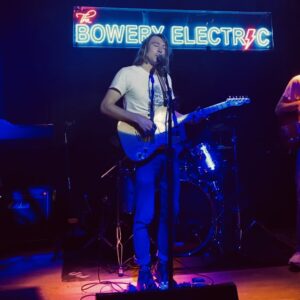
How is it balancing your passion for music and your education in Naval Architecture and Marine Engineering?
The truth is, I do prioritize my career over my music. Luckily, because of the nature of the music industry, I rarely have to sacrifice musical opportunities. My rehearsals and shows are nearly always at night. Also, my musical inspiration often comes alive late in the evening, which is when I write and record. I do have to be careful about burnout. I’ve learned to schedule breaks in my musical activities to fully recuperate before diving back in.
What role do you feel Webb played in shaping your journey as a musician or individual?
Webb taught me that many things that seem impossible, are not. Having that recognition is key to learning new things and getting better at what you do. I wrote a lot of bad songs when I first started and I was worried I’d be a bad songwriter forever, but with practice and patience my songwriting definitively improved over the years. At least I like where my songwriting is headed, but maybe others disagree. That’s another thing I learned while living and working in a tight community. You’ll never get everyone to completely agree on something. This is especially true in the music world where things are subjective.
What advice do you have for Webb students on life after graduation?
What’s been surprising to me are the number of similarities between life as a student and life in the workforce. If you want to get to know people, join a social club. If you want to learn, be curious and ask questions. In other words, the behaviors and habits you foster in school sometimes carry through into your adulting life.
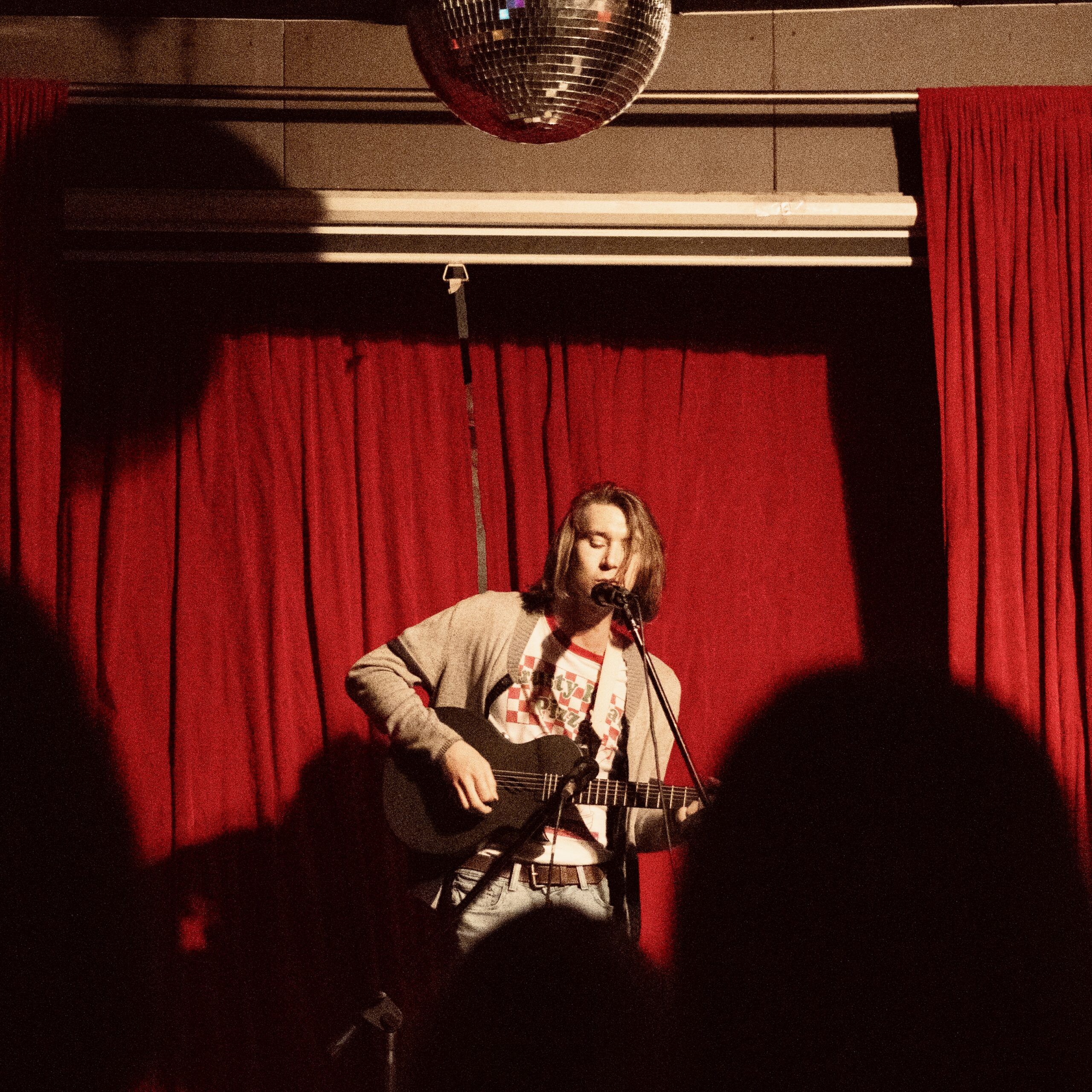
Class of 2025 Recreates Famous Artwork
Each year, Professor Richard Harris’s Western Culture II class participates in an art project that challenges students to recreate an illustration or painting.
This year, the Class of 2025 recreated artwork from the post-Impressionist period or later from artists such as Franco Costa, Marc Chagall, and Henri Matisse. The class is designed to help students develop their critical eye and appreciation for art and the sense of composition and color.
Students carefully study the original work, break them down and recreate them using their own techniques and understanding. They paid attention to details that might otherwise be overlooked – translating into their own creative process.
Upon completion, the students’ work was exhibited in the Visconti Reception Room during graduation week, June 12-19. The exhibit was a testament to their creativity and hard work.
Winter Work Term: Andrej Klema ’25
Where are you working for the Winter Work term?
I have taken a year off from Webb to do ten months of “Winter” work. This includes one sea term and one office term. My office term is at the United States National Ice Center in Suitland, Maryland. My sea term is on U.S. Coast Guard Cutter POLAR STAR for Operation Deep Freeze 2023. We started our deployment in November, leaving from POLAR STAR’s homeport in Seattle, Washington. Our port calls so far have included: Pearl Harbor, Hawaii; Sydney, Australia; Hobart, Tasmania; and McMurdo Station, Antarctica. Upcoming ports include Punta Arenas, Chile; Valparaiso, Chile; and San Francisco, California.
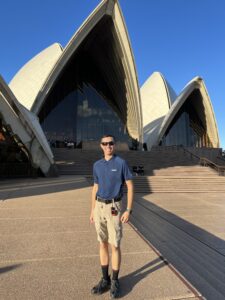
Naval Architect in the Making: Andrej stands in front of the beautiful architecture dome of the Sydney Opera House, working alongside the U.S. Coast Guard Operations team throughout the summer.
Why are you interested in this company?
I have always been drawn to military service. One of the reasons why the Coast Guard appeals to me is the domestic focus of the missions. I appreciate how the Coast Guard missions are focused on serving the American people in a variety of ways from SAR to drug interdiction. I also appreciate how the Coast Guard is involved in action every day. Yes, some days are training missions, but between commercial, recreational, and illegal activity in our nation’s waters, airspace, and 360 ports, every day presents new action and an opportunity to make a significant difference in the lives of everyday Americans. This does not even cover Coast Guard operations OCONUS, like the one I am a part of. Another reason why the Coast Guard appeals to me is its size and the opportunities that come with it. The Coast Guard is a small branch, and as a result, the community is tightly knit. In addition, the small size of the service means that there are many leadership opportunities for junior officers. In no other branch have I found that a Lieutenant Junior Grade can be a commanding officer. Finally, I have been raised to be a steward of the environment, and the Coast Guard’s missions for environmental protection and law enforcement are something that I take very personally and take great pride in being a part of. I am grateful for the opportunities the United States Coast Guard presents to help protect my homeland, take care of our environment, and save lives.
What was the most challenging task you faced during your internship, and did you overcome it?
The most challenging task I have faced during my internship so far has been creating an integration between our satellite data processing software and the ship’s navigation system. I was able to overcome this challenge by creating a diverse team of subject matter experts from a variety of different agencies and the software contractors. Together, we were able to de-bug the integration and use it during our operations in the Antarctic region. I will be continuing work on this project when I return to the U.S. National Ice Center in April.
What is the most memorable moment of your internship experience?
The most memorable moment of my internship experience has to be taking the Con of POLAR STAR as we turned on to an ice navigation trackline that I made from my software integration project.
Where do you see yourself after this internship (or after graduation)?
After graduation, I see myself commissioning into the Coast Guard on a career path towards becoming an Engineering Officer Afloat. I intend to do a full twenty years at minimum.
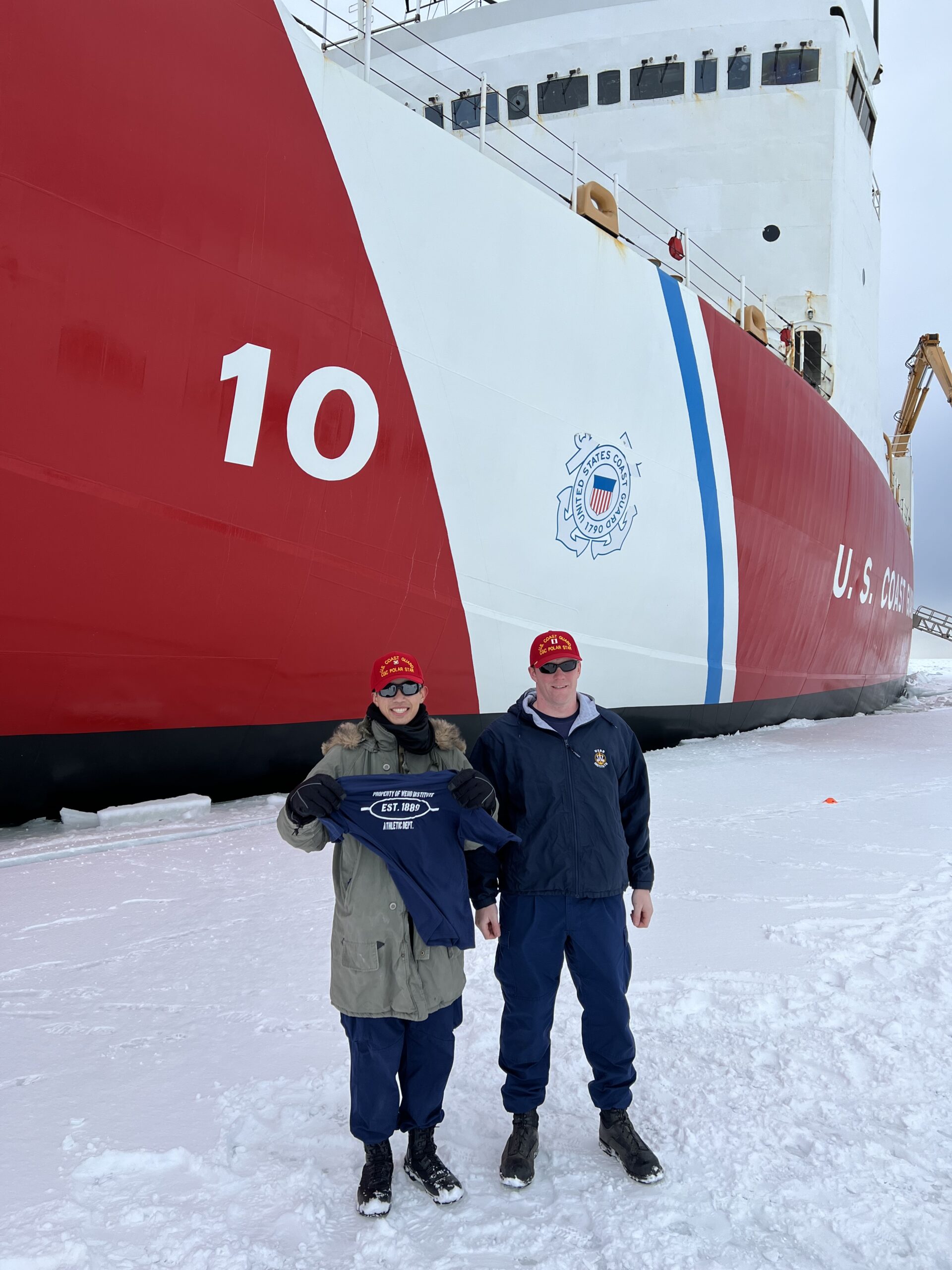
Conquering Icy Seas: Andrej is sailing aboard the heavy icebreaker, USCGC Polar Star, in support of Operation Deep Freeze.
Winter Work: Jonathan Allen ’23 – Webb Senior Ready to Conquer the World
Welcome to the exhilarating world of Webb Senior, Jonathan Allen, who is on the journey to international success, one adventure at a time- beginning with New Zealand. Jonathan is an ambitious go-getter who utilized his opportunity to intern globally through Webb’s Winter Work internship program.
With his eyes set on the prize – his career and freedom – to go where the journey takes him, he shares his experiences and lessons. Jonathan offers advice on how to secure an international internship as well as dares us to dream bigger.
Throughout it all, Jonathan remains grateful to Webb for pushing him to embark on an unforgettable journey that shaped his future.
Where are you working for the Winter Work term?
I am working this winter/summer in sunny Auckland, New Zealand. The company I am working for is called Marine Industrial Design (MID), a subsidiary of Babcock International, a multinational engineering solutions company based in the UK. Babcock provides defense and specialized technical expertise to several countries across the globe, including the Royal New Zealand Navy (RNZN), which is one of the main customers MID serves. I work at the Devonport Naval Base, across the bay from downtown Auckland. It has beautiful views of Auckland and the surrounding sprawling volcanic hills that dot the landscape.
Why are you interested in this company?
I was interested in working for MID for two main reasons. The first was MID is an established Naval Architecture/Marine Engineering firm. This being my senior year, I felt it was important to experience a traditional office job before I graduate and decide my future. I have been privileged to have unique work experiences my freshman and junior years, but this job closely mirrors the expertise I have learned at Webb. The second, and pretty obvious one, is that New Zealand in the summer is a huge draw. I love to travel, see the world, and would eventually like to live internationally. This two-month internship gives me an opportunity to try living independently in new surroundings, while also knowing if I don’t love it, I’m not stuck here. So far; however, I have loved being here.
How is the work environment?
The work environment has been fun, inclusive, and flexible. Gram Schweikert, Webb Class of 2002, is my manager and has made me feel at home while away from home. He even very kindly let me stay with him the first few days I was in New Zealand before my Airbnb house opened up. The other employees and interns I have met at MID have all been really nice and welcoming. I have not been stuck on a problem that someone hasn’t been able to happily help me with. The work schedule at MID is flexible too which has been a really nice thing. Employees are required to work from 9am to 3pm, but can make up their hours earlier or later to meet the 40 hour workweek as they see fit. Although I don’t plan on utilizing it, MID also is very flexible about working from home. This is a Babcock policy they call Agile, and it seems to be a very popular, person-oriented one.
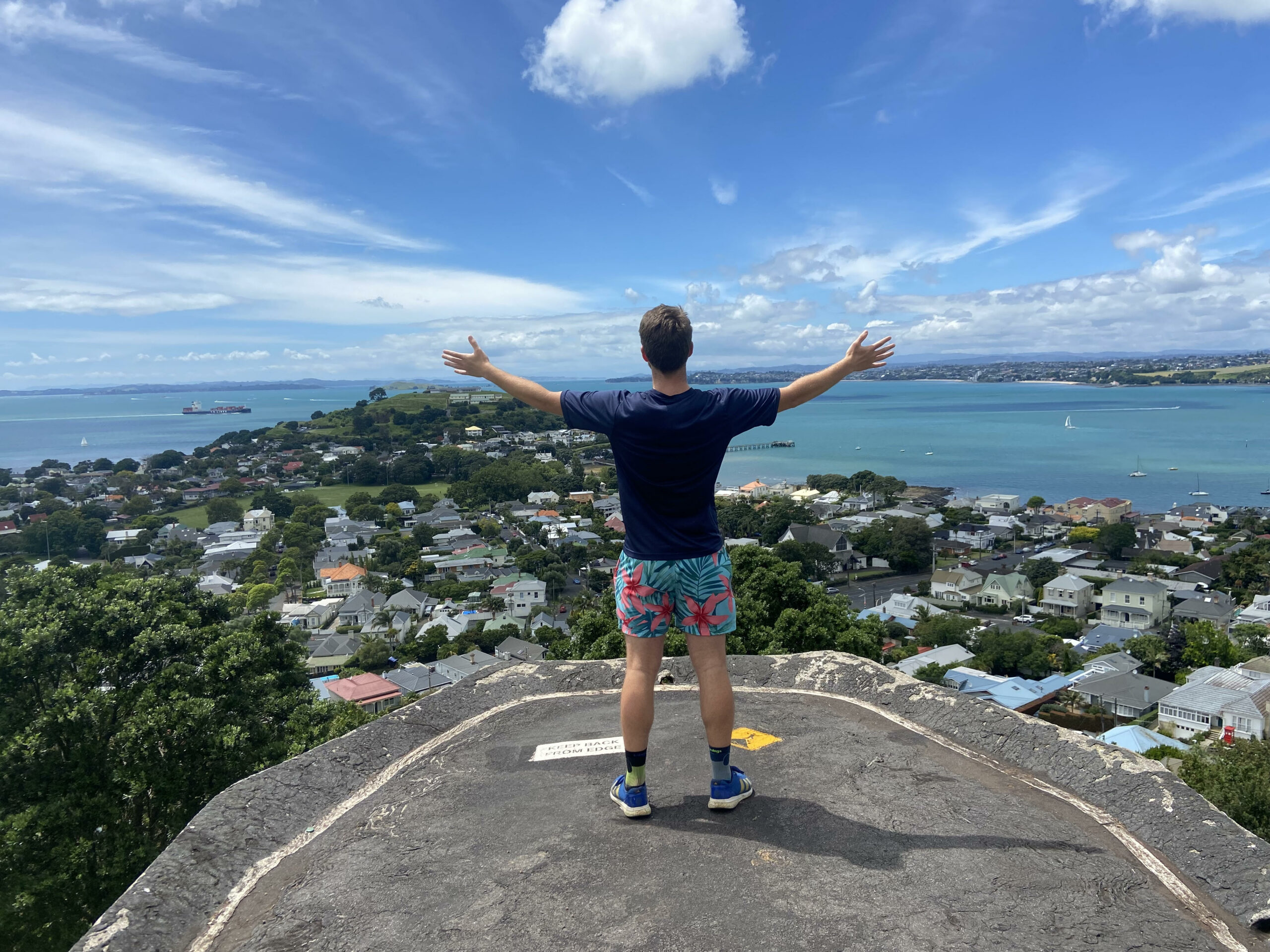
Embracing Adventure: Jonathan takes in the breathtaking view of New Zealand and believes that the world is really his oyster.
What skills are you learning at the company?
As I mentioned previously, MID is a Naval Architecture and Marine Engineering company. I get to utilize all of the skills I have acquired through the 11 NA/ME courses I’ve had so far. It feels surreal to say I have had 11 NA/ME courses. It seems like just yesterday I was in ME I. For example, two of the projects I am working on now use skills I’ve learned at Webb. While I cannot get into specifics, for one project I am using CAD software to find solutions on how to improve the stability of a class of vessels. In the other, I am using the strength and materials knowledge and skills to ensure that implementation of new equipment is safe to implement. Without Webb, I would be lost when trying to find solutions to these critical aspects of ship design.
Why are you the best candidate for this internship?
While I cannot claim that I am somehow “the best” or “better” than other candidates for this internship, I was the one who put in the hard work to make it happen. With the pandemic raging, finding an international internship, especially one on a carefully-guarded island nation like New Zealand, was very difficult. What I was able to do, and what I would encourage all Webbies seeking new, exciting, and extraordinary internships to do is utilize Webb’s amazing alumni network. I found this internship by perusing the Webb community portal. There you can find all Webb alumni, where they live, where they work, and if they are open to helping students. In my experience, Webbies are a friendly bunch and often go out of their way to help others, especially Webbies. That is what Gram Schweikert did for me. While MID usually has two interns a year from Australia/New Zealand, he was able to secure a third spot for me. I had to do the hard work of visa paperwork, security clearances, and travel logistics, but without a Webbie on the inside like Gram, it would have been nearly impossible to come here to Auckland. I would encourage Webbies to seek out these types of jobs as early as possible. It has been more than two years since I learned about MID and more than 14 months since I first contacted Gram asking about the possibility of me working for MID. Get your foot in the door early, follow up promptly, and you will find yourself with amazing opportunities. I sure did.
Where do you see yourself after this internship (or after graduation)?
After graduation, I plan on working, uh, somewhere haha. I am not at this point committed to any particular direction. I do not plan on living and working at the same place my entire life, and I plan on determining what I want to do with the next phase of my life when the time feels right. Mostly, I want to work somewhere that challenges me professionally, supports me financially, and excites me when I wake up in the morning. If I can find a job that does that, I think I’ll be alright.
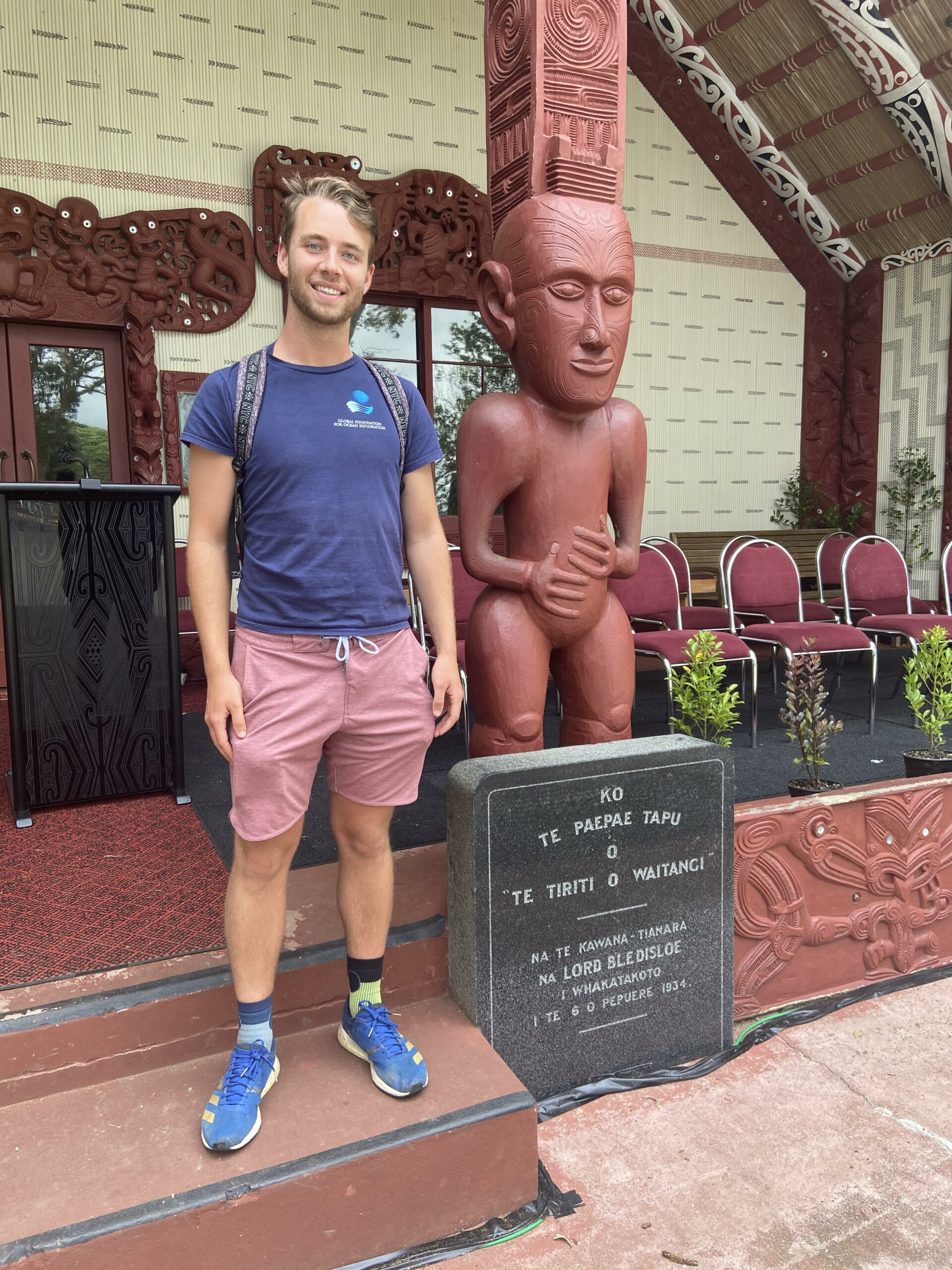
Standing Tall: Jonathan immerses himself in New Zealand’s culture and gives respect to its rich history
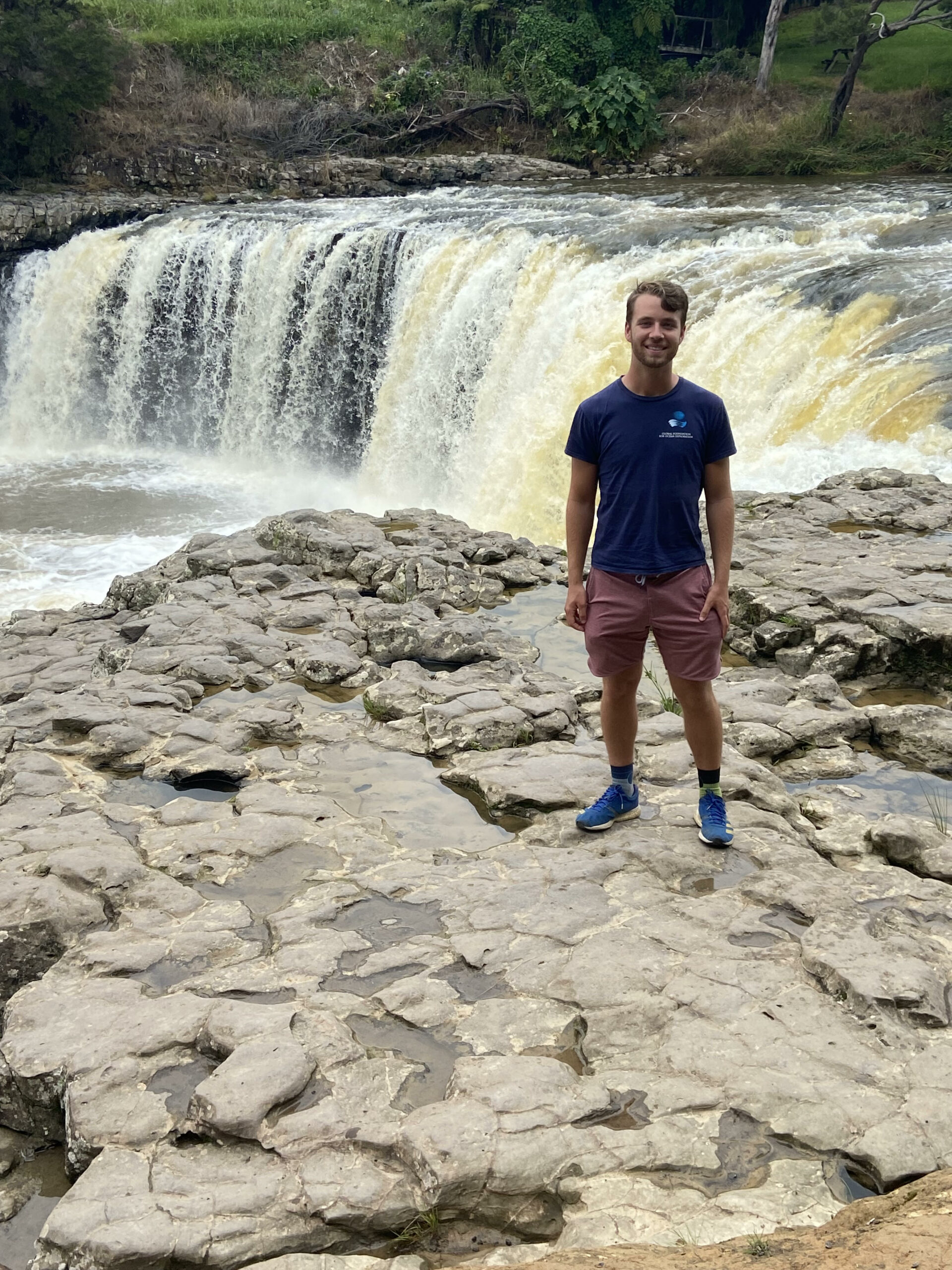
Nature’s Temptations: Jonathan admires the serene beauty of New Zealand’s waterfalls and environment yet resists the urge to take that plunge.
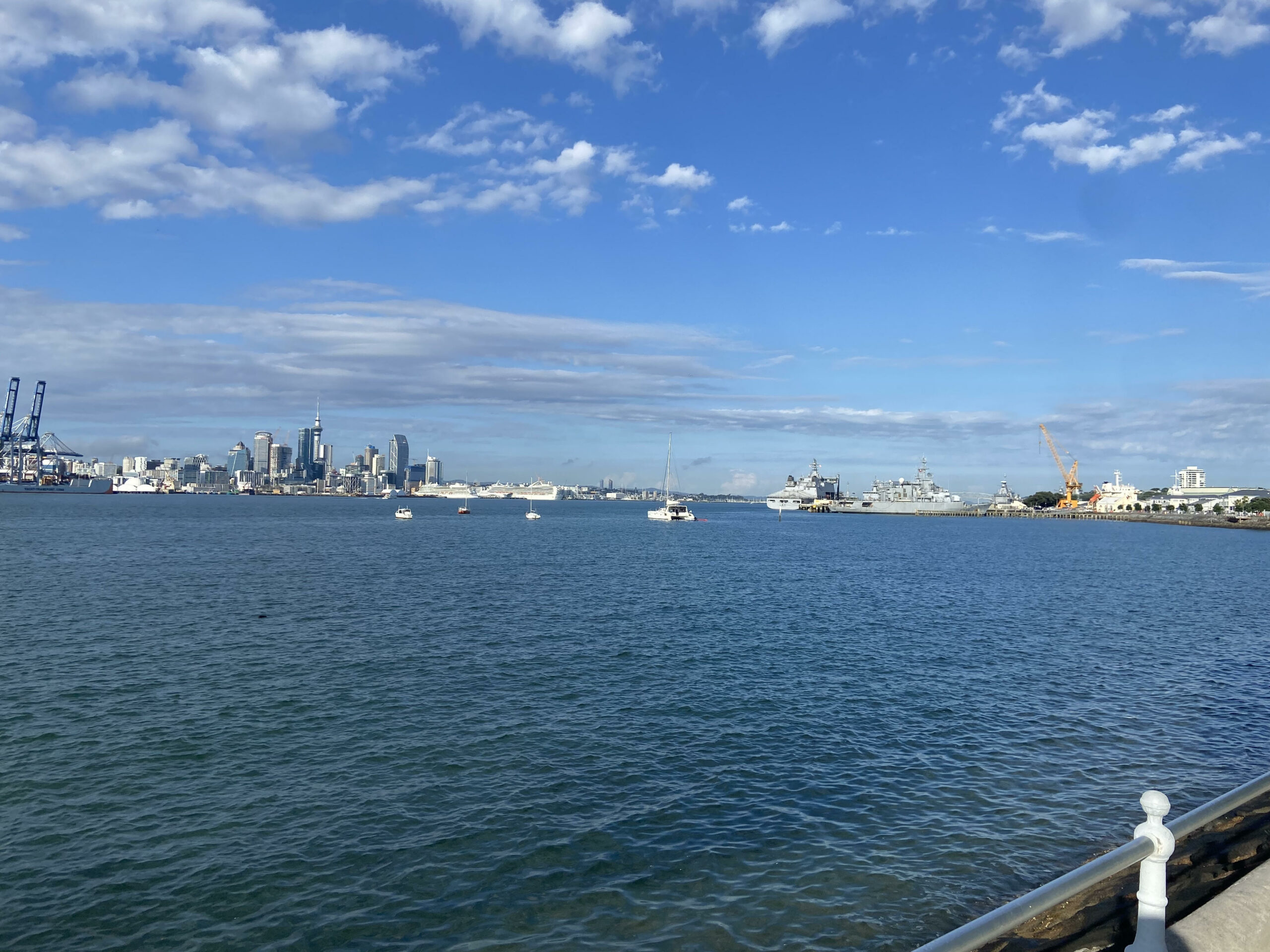
From New York to New Zealand: Webbies embrace the adventure of exploring the world while finding a home in a historic mansion in Glen Cove, New York.
Winter Work: Paul Ferragu ’26 – A Freshman’s Voyage to a Shipbuilder’s Dream
Webbies are taking on their Winter Work internships fearlessly, and they have started a blog to share their experiences and insights with us.
The blog will cover a range of topics from the skills they have learned to the personal growth they have experienced throughout their time in the program.
Our first blog post is written by Paul Ferragu, a Freshman at Webb who is currently at the prestigious Chantiers de l’Atlantique for his Winter Work internship. Paul shows us that no matter where you are in life, with the right mindset, you can do anything and go anywhere.
Follow along with us on the journey!
Where are you working for the Winter Work term?
I’m spending my freshman Winter Work Term at the Chantiers de l’Atlantique in Saint-Nazaire, France.
Why are you interested in this company?
I was originally interested in this company because they design and build the world’s largest cruise ships for leading cruise lines and are at the front of innovation toward sustainable shipping. Although I don’t have a passion for cruise ships, their complexity is certainly fascinating. Everything I learn here will be applicable in almost every other sector of the industry. My personal favorite project they are working on is the Solid Sail.
How is the work environment?
I am part of an outfitting supervising team. I joined a team of 7 who specializes in supervising the outfitting of anything welded or attached to the metallic hull of the ship. This includes life-saving apparatuses, strategic fire-fighting equipment, mooring decks, hydraulic doors, machinery, and balconies. During my winter work term, I will be supervising the installation of some life-saving apparatuses.
What skills are you learning at the company?
I am learning technical French terminology and the logistics behind such a large and complex shipyard – there can be up to 8,000-10,000 personnel in the yard at a time and up to 4 ships under construction. There is activity 24/7 in the yard, and thousand-ton blocks are being lifted on an almost daily basis. I am also taking this opportunity to ask questions about the design process of ships. It takes 500 engineers and technicians to realize all the different ship’s plans fully. I am able to help my team with translating English to French and teaching them English terminology to ease their communication with contractors.
Why are you the best candidate for this internship?
I showed interest in learning from the world’s leading passenger ship shipyard and my French language skills enabled me to do my job in the language spoken daily within my team and with contractors. Some overseas shipyards can accommodate English speakers but that is not standard in French yards.
Where do you see yourself after this internship (or after graduation)?
As I am only a freshman, I will return to Webb after the winter work term to explore more sectors before deciding on one to pursue during my early professional career. I do hope to come back to this shipyard in my junior year to work in the design offices of their new sail and Liquified Natural Gas (LNG) -propelled ships.
Winter Work Term: More than a Robotics Company
by Jonathan Allen ’23
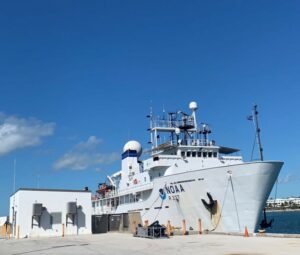
I’m sure you’ve heard the phrase “Good things come to those who wait”. When finding winter work spots, I wouldn’t recommend it, but I got lucky for my junior year internship. I still did not have a job lined up in early December when Professor Golden sent out an email saying an underwater robotics company was looking for two interns. A cover letter, interview, and acceptance letter in a couple days and I had booked my ticket for the sunny shores of central Rhode Island. Three months later and I had completed my favorite internship on the chilly shores of Key West.
The Global Foundation for Ocean Exploration (GFOE) is more than just a robotics company. They design, build, maintain, and operate some of the most sophisticated remotely operated vehicles (ROVs) in the world. They run expeditions across the seven seas searching for some of the world’s most isolated plants, animals, and shipwrecks. Capable of going 6000 meters deep, almost four miles, deep, GFOE has explored areas such as the Hawaiian Islands, Mid-Atlantic Ridge, and Marianas Trench.
I did my internship with Evan Spalding, a sophomore who, like me, absolutely loves to ski. We went skiing several times in Vermont and his home “mountain” of Yawgoo on a powder day. I also took trips to Newport, Maine, and Boston. Weekends were always fun to explore the Northeast in the winter for a Florida man.
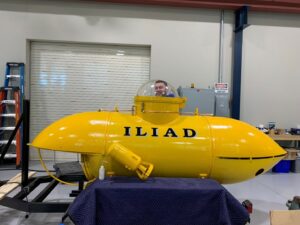
I worked at GFOE’s main workshop in Quonset, Rhode Island for seven weeks. While there, I got to go hands-on almost every single day with their two largest ROVs, Deep Discoverer (D2) and Seirios. From the first day, they had Evan and I working on the different systems. The first week we completely took apart and reassembled the rock boxes and drawers on D2. After that, I worked on the hydraulics system, tracing out the different components and adjusting the manifold settings so the speeds were correct. Then using Solidworks I made from scratch an adapter piece for the new PDM cable on D2 that was put out for order a week later. One of my favorite things was to restore an old mini-sub that used to dive in Narragansett Bay. It will now be on display at the Mystic Seaport Museum. These are just a few of the things they had Evan and I doing, and we never found ourselves without meaningful and interesting work.
The highlight of the internship; however, had to be my 10 days going from Pascagoula to Key West on a “shakedown cruise” aboard NOAA’s Okeanos Explorer. All of the mission systems on board were rigorously tested to get ready for their spring and summer expeditions. I shadowed all the different team members from the deck hands, navigator, co-pilots, and winch team. I quickly fell into a pattern on board and enjoyed life on the water.

I liked it so much, I went back. This summer I was part of their expedition to the Azores Islands off the coast of Portugal for 28 days. I’m especially thankful to Professor Golden for connecting to me to this great company filled with awesome people. Even if I had to wait for it.

